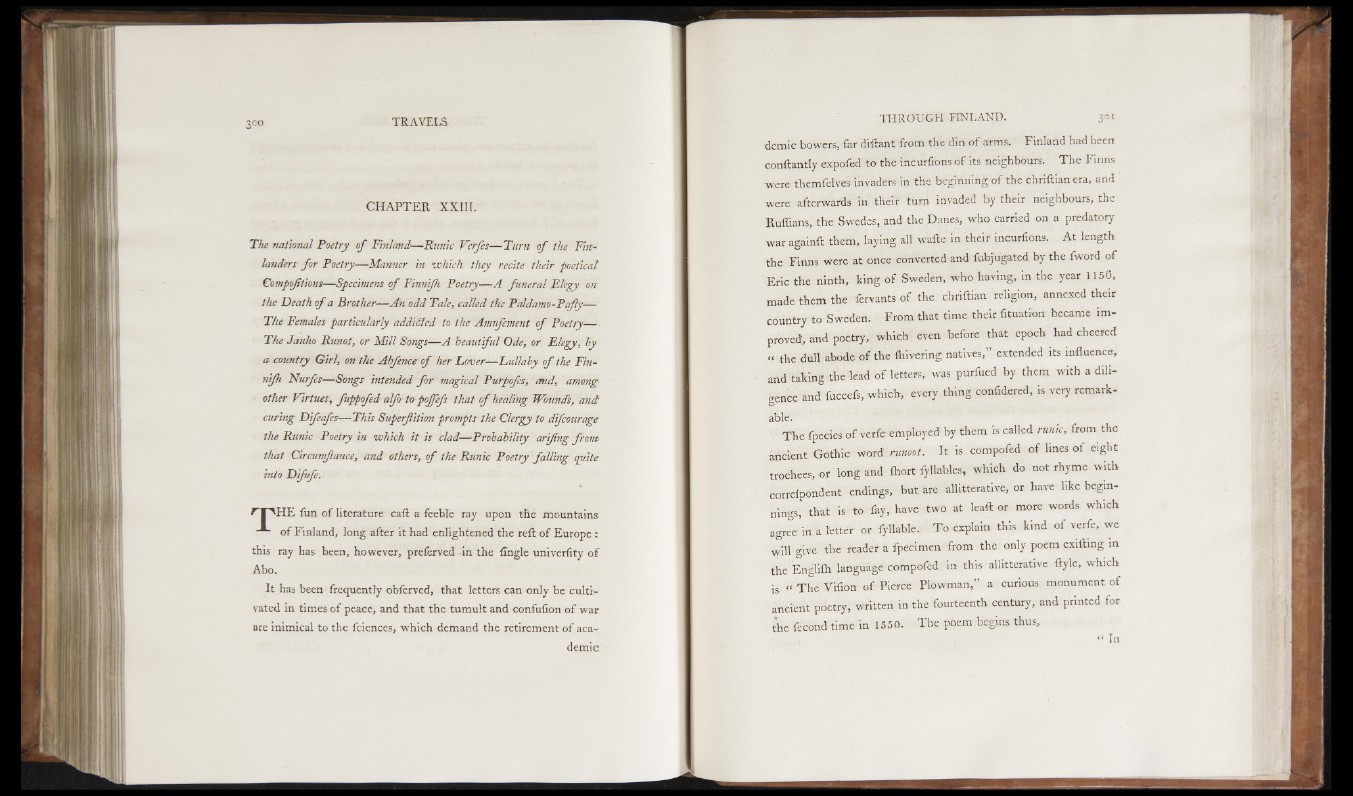
CH A P T E R XXIII.
The national Poetry of Finland—Runic Verfes-—Turn of the, Finlanders
for Poetry— Manner in which they recite their poetical
Compoftions—Specimens of Finnifh Poetry— A funeral Elegy on
the Death of a Brother— An odd Tale, called the Paldamo-Pafty-—
The Females particularly addiSted to the Amufement of Poetry-— .
The Jauho Runot, or Mill Songs— A beautiful Ode, or Elegy, by
a country Girl, on the Abjhnce of her Lover— Lullaby of the Fin-
nifh Nurfes— Songs intended for magical Purpofes, and, among-
other Virtues, fuppofed alfo to pojfefs that of healing Wound's, and
curing Difeafes— This Superflition prompts the Clergy to difcourage
the Runic Poetry in which it is clad—Probability arifihg from
that Circumflance, and others, of the Runic Poetry falling quite
into Difufe.
r | ''H E fun o f literature call a feeble ray upon the mountains
o f Finland, long after it had enlightened the reft o f E urope:
this ray has been, however, preferved in the Engle univerfxty o f
Abo.
It has been frequently obferved, that letters can only be cultivated
in times o f peace, and that the tumult and confufion o f w ar
are inimical to the fciences, which demand the retirement o f academic
demie bowers, far diftant from the din o f arms. Finland had been
conftantly expofed to the incurfions o f its neighbours. T he Finns
were themfelves invaders in the beginning o f the chriftianera, and
were afterwards in their turn invaded by their neighbours, the
Ruffians, the Swedes, and the Danes, who carried on a predatory
war againft them, laying all wafte in their incurfions. A t length
the Finns were at once converted and fubjugated by the fword o f
Eric the ninth, king o f Sweden, who having, in the year 1150,
made them the fervants o f the cbriftian religion, annexed their
country to Sweden. From that time their fituation became improved,
and poetry, which even before that epoch had cheered
« the dull abode o f the ihivering natives,” extended its influence,
and taking the lead o f letters, was purfued by them with a diligence
and fuccefs, which, every thing confidered, is very remark-
D
able. ' ■’ _
T h e f p e c i e s o f verier employed by them is called runic, from the
ancient Gothic word runoot. It is compofed o f lines o f eight
trochees, or long and ihort fyllables, which do not rhyme with
correlpondent endings, but are allitterative, or have like beginnings,
that is to fay, have two at leaft or- more words which
agree in a letter or fyllable. T o explain this kind o f verfe, we
will give the reader a fpecimen from the only poem exifting in
the Engliih language compofed in this allitterative ftyle, which
is I T h e Vifion o f Pierce Plowman,” a curious monument of
ancient poetry, written in the fourteenth century, and printed for
the fécond time in 1550. The poem begins thus,
“ In